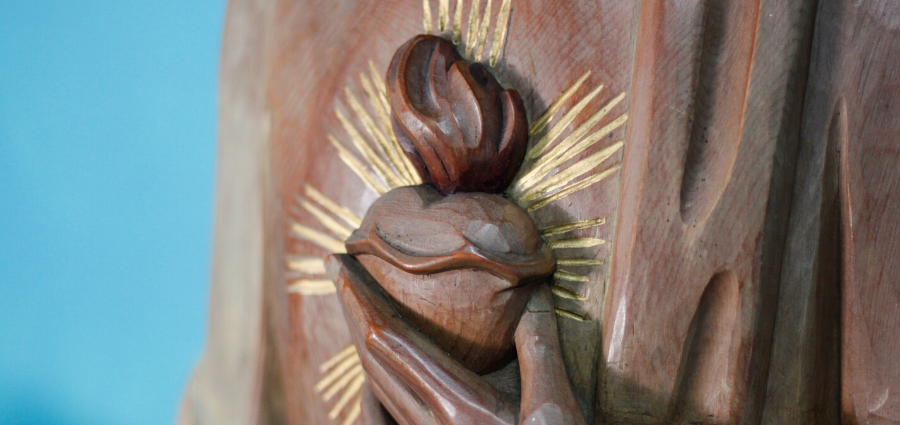
By: Nicole O'Leary on June 24th, 2022
Beloved Disciples of the Sacred Heart
Sixteen centuries after Saint John rested near the Heart of Jesus at the Last Supper (cf. Jn. 13:23), Our Lord extended the same invitation to a simple nun of the Visitation Convent of Paray-le-Monial, France.
On December 27, 1673, Jesus appeared to Saint Margaret Mary Alacoque and invited her to repose upon His breast. Opening His Heart to her, He revealed His deeply personal love, giving Margaret Mary, like Saint John, a new name: “the beloved disciple of My Sacred Heart.”
During these interactions, Jesus not only communicated His special predilection for Margaret Mary and revealed to the saint her deepest identity; He also spoke of the unquenchable fire of His love for all men.
“Behold this Heart,” He said in a 1675 apparition, “Which has loved men so much, that It has spared nothing, even to exhausting and consuming Itself, in order to testify to them Its love; and in return I receive from the greater number nothing but ingratitude by reason of their irreverence and sacrileges, and by the coldness and contempt which they show Me in this Sacrament of Love…”
The fire of Divine Love, Margaret Mary discovered, is a blaze stronger than anything fashioned to contain it — with one exception. The only force that can prevent the Heart of God from communicating Its love to man, is, in fact, man himself.
Notably, as Jesus indicates, it is not only the expressly atheistic soul that erects a barrier to love. It is the once-fervent soul that has grown cold. It is the soul which boasts of its love for God but refuses to relinquish the seemingly insignificant pleasures that keep Him at a distance. It is the soul which, under the pretext of humility, concludes that God is calling others (but surely not me) to a living friendship with Him. It is the soul that simply chooses not to care.
God has a Heart — a human Heart united to the Person of the Word — and in opening His Heart to His creatures in an unconditional act of self-offering, He has decidedly made that Heart vulnerable to rejection and indifference.
Furthermore, Jesus’ words to St. Margaret Mary, spoken in the present tense, remind us that God’s Heart is a living Heart. Indifferent onlookers along the way of the Cross and disciples cowering in the surrounding territory are not alone in their culpability for grieving Him. In the same sentence in which He presents His Heart burning with love for men, Jesus likewise speaks of the mode by which this Heart continues to abide among them–and thus continues to receive the blows of their contempt.
This “Sacrament of Love” of which Jesus spoke, Sacramentum Caritatis, is the Eucharist. What Saint Joan of Arc famously professed about Our Lord and His Church (“About Jesus Christ and the Church, I simply know they’re just one thing”) can, in like manner, be said about the Sacred Heart and the Blessed Sacrament.
To believe this is to recognize that Jesus extends to each of us the privilege He offered Saints John and Margaret Mary when He invited them to rest upon His breast and listen to His Heart. To receive Him in Holy Communion is to meet Him in this way — and so much more profoundly.
Thus we, like the two saints of our study, are invited to find our repose in Him. We have the opportunity to hear Him confer upon each of us the identity of Beloved. We have the chance — if we make the deliberate effort to engage with Him — to have the feeble flames of our own love rekindled in the presence of His unquenchable blaze.
To perceive Jesus in the Eucharist, however, is also to recognize that we have the very real opportunity to cause Him pain. Of the 1673 apparition, St. Margaret Mary writes, “It was then that He … showed me to what an excess He had loved men, from whom He received only ingratitude and contempt. ‘I feel this more,’ He said, ‘than all that I suffered during My Passion. If only they would make Me some return for My love, I should think but little of all I have done for them and would wish, were it possible, to suffer still more…”
Amid the anguish of these words, Jesus confers on us an additional, extraordinary privilege: we have, in the Eucharist, the opportunity to console His living Heart in the very midst of His suffering.
But what consolation can we give to God who is infinite and lacks nothing? What can we offer to Divine Love for offenses against Love?
God lacks only the love and gratitude of those souls who withhold themselves from Him. Only I can give Him my love.
To this end, Jesus revealed to St. Margaret Mary the manner in which He desired us to console His Sacred Heart. In addition to the observance of the Solemnity of the Sacred Heart (celebrated, this year, on June 24), He asked for a Communion of Reparation to the Sacred Heart on the First Friday of nine consecutive months. Other practices associated with this devotion include adoration of the Blessed Sacrament, going to Confession, and making acts of reparation.
When you enter a church, do not be deceived by the silence; there is a wildfire burning in the tabernacle. It is the Heart of God, consumed with the longing for love. What He asks of us, for all of its apparent simplicity, is the difference between restricting His flames and allowing Him to set fire to the hearts of men.
“There is nothing hidden from its heat,” (Ps. 19:6).
